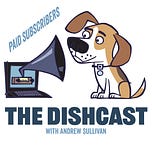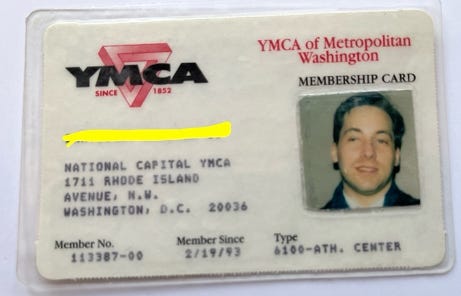Ross is a writer and a dear old colleague, back when we were both bloggers at The Atlantic. Since then he’s been a columnist at the New York Times — and, in my mind, he’s the best columnist in the country. The author of many books, including Grand New Party and The Decadent Society, his new one is Believe: Why Everyone Should Be Religious (which you can pre-order now). So in this podcast, I play — literally — Devil’s advocate. Forgive me for getting stuck on the meaning of the universe in the first 20 minutes or so. It picks up after that.
For two clips of our convo — on the difference between proselytizing and evangelizing, and the “hallucinations of the sane” — see our YouTube page.
Other topics: Creation; the improbable parameters of the Big Bang; the “fine-tuning” argument I cannot understand; extraterrestrial life; Hitchhiker’s Guide to the Galaxy; Hitch; the atheist/materialist view; the multiverse; quantum physics; consciousness; John von Neumann; Isaac Newton; human evolution; tribal survival; the exponential unity of global knowledge; Stephen Barr’s Modern Physics and Ancient Faith; the substack Bentham’s Bulldog; why humans wonder; miracles; Sebastian Junger and near-death experiences; the scientific method; William James; religious individualists; cults; Vatican II; Pope Francis; the sex-abuse crisis in the Church; suffering and theodicy; Lyme Disease; the AIDS crisis; Jesus and the Resurrection; Peter J Williams’ Can We Trust the Gospels?; and the natural selection of religions.
Browse the Dishcast archive for an episode you might enjoy (the first 102 are free in their entirety — subscribe to get everything else). Coming up: Jon Rauch on the tribalism of white evangelicals; Evan Wolfson on the history of marriage equality, Yoni Appelbaum on how America stopped building things, Chris Caldwell on the political shifts in Europe, Nick Denton on the evolution of new media, Francis Collins on faith and science, and Mike White of White Lotus fame. Please send any guest recs, dissents, and other comments to dish@andrewsullivan.com.
On last week’s episode with Sebastian Junger on near-death experiences, a listener points to the following video for the part of the pod where we discuss quantum physics and consciousness:
I’m not scientifically qualified to make a point on this. But I have a little more respect for Ross and Sebastian than for Tyson. Here’s another view on near-death experiences:
Sebastian Junger’s claim that NDEs are uncannily alike, especially through history, isn’t accurate. I wrote about this years ago for the L.A. Times. NDEs often vary according to a person’s culture and beliefs. For example, American afterlife visitors typically say God sent them back because “it’s not your time yet,” whereas India’s near-death survivors are told there was a “clerical error.” Also, in centuries past, postmortem voyagers frequently went to purgatory or hell, whereas today’s sojourners ascend to a decidedly nonjudgmental heaven, according to Carol Zaleski’s Otherworld Journeys, a comparison of modern and ancient near-death accounts. NDEs are a fascinating topic, and Junger’s experiences are intriguing, but I don’t think some of what he said holds up.
From a listener who liked that episode and others:
I enjoyed John Gray’s second appearance on your show, as well as Sebastian Junger and your friendly teasing of him. Too bad neither you nor Gray appreciate food or drink. I’m a serious cook and not a glutton, but food is a great pleasure. It’s infinitely superior to marijuana and hallucinogens, which open a door to nowhere. Your buddy Rod Dreher thinks it’s a door opened for Satan’s entrance. Well, I don’t know about that, but I suspect drug insight is not so much false as non-existent.
By the way, I loved your reading of “Aubade” on the Junger episode, and one of my favorite guests on your podcast was Christian Wiman.
Another listener on the John Gray pod:
I enjoyed your conversation with Gray, and now I have to download his book to try and better understand his ideas. One thing struck me throughout the conversation: I would have liked you (and Gray) to define what you mean by the term “liberal” or “liberalism”. As you know, Europeans and Americans often mean very different things when talking about liberalism. Europeans (especially continentals) tend to mean free-market capitalism, as opposed to socialistic or highly regulated economies. The “free” being the operative word, and individual freedom in the social sphere may be understood, but I haven’t noticed it being an essential part of the European usage.
For Americans, liberal means leftist, especially social and culture radicalism. To the extent American liberals are associated with economic issues, they are dirigiste, pro-regulation. It seemed to me that you and Gray were floating between these definitions of liberalism. Am I wrong? Could you please take a moment to clarify what liberalism means to you?
I thought I did. I usually do. Here’s my post, “Removing the Bedrock of Liberalism,” which lays it out clearly. Another listener asks about a philosopher I discussed at length with John Gray:
I have only read Oakeshott sporadically, largely by bouncing around Rationalism in politics and other essays. If I wanted to do a dive into his work, should I start with On Human Conduct, or just commit fully to Rationalism in politics and other essays, or should I start somewhere else?
I’m especially interested if Oakeshott has commentary on Burke’s notion of a social contract with the future. Coming off of a fresh read of Reflections on the Revolution in France, it struck me that Burke’s writing is actually quite convoluted. If anything, the idea that people are bound by a “fixed compact sanctioned by the inviolable oath which holds all physical and all moral natures, each in their appointed place” reads to me as a duty and not a contract. (These readings are part of a larger project I’m pursuing to reframe “what we owe the future” in terms of a duty, rather than in pure utilitarianism.)
Oakeshott was not that interested in Burke. My own idiosyncratic take is that the last chapter in On Human Conduct is a good place to get a flavor of the man.
Another listener has a blast from the past:
As an aside, I would be surprised if you recognize me, but during your episode with Anderson Cooper, I discovered that we were all members of the same YMCA when I was living in DC in the ‘90s. (I also occasionally attended Mass at St. Matthew’s Cathedral.) I don’t know whether I should be embarrassed or proud to admit that I still have my old gym ID, which I found among expired passports and driver licenses:
Ha! It’s gone now. Here’s a rec for a return guest, Fareed Zakaria:
One of the best books I’ve read in the past 20 years is Zakaria’s 2008 book The Post-American World. I think it was misunderstood, as many thought it was an anti-American book, but it really focused on how the rest of the world was rising and the US had less influence and economic impact than it did in the post-WWII era.
I’ve thought of this book often during the first few chaotic weeks of the Trump administration. During his first term, I heard Zakaria on an interview speaking about how Trump was accelerating trends he had written about in his book. As Trump flexes his muscles with Canada, Mexico, and countries in South and Central America, it feels like whatever gains Trump is making in the short term will cause countries to further distance themselves from us in the long term. (There’s an new article in the NYT about this: “One Response to Trump’s Tariffs: Trade That Excludes the U.S.”) I’m curious to hear Zakaria’s thoughts on these trends and how Trump is impacting the decades to come, in what feels like a new era.
Fareed has been very vocal so far. Next up, a reader dissents over the latest Dish:
I’ve just read the dissents you chose to publish and your frankly flippant responses. I want to note one more thing for you: Trump’s executive orders don’t just threaten DEI, but DEIA, which includes accessibility. Accessibility has several meanings, but one of them is the procurement and design of technology that is accessible to Americans with disabilities, such as blind people like myself who use screen reader technology to read digital content, including your blog.
I was hopeful that Trump did not plan to attack this aspect, but his attacks on the disability hiring policies of the FAA indicate that people like me are to be marginalized by his administration. He asserted, falsely, that people with very severe disabilities were being hired as air traffic controllers, and then generally attacked disabled people. (He was every inch the man whom Fred Trump III alleges told him to allow his disabled son to die.) This is unacceptable, regardless of what you or anyone else thinks of DEI — which has nothing to do with the bipartisan Americans with Disabilities Act passed over 30 years ago.
Which is why the ADA is still in force — and that is obviously separate from DEI. But I can see why broad references to DEIA in Trump’s executive orders could be alarming. Here is the National Association for the Deaf’s response to this. The WaPo reports that S. Jordan Wright, director of communications for the Registry of Interpreters for the Deaf, is confused, as he may well be: “Things are up in the air right now. We don’t know exactly what’s going on.” I’d only note that the ADA remains the law of the land.
DEIA is also personal for this reader:
I am in the disabled category, having been born profoundly deaf.
Listen to this episode with a 7-day free trial
Subscribe to The Weekly Dish to listen to this post and get 7 days of free access to the full post archives.














